- Home
- Isabel Allende
A Long Petal of the Sea Page 24
A Long Petal of the Sea Read online
Page 24
He was writing his memoirs, in which the Spanish Civil War and the Winnipeg filled several pages. He grew emotional when he recalled all the many Spanish friends who had been murdered or were missing. “I don’t want to die before Franco,” he would say. Victor assured him he would live for many years: his illness was slow-moving and under control, but he too suspected the Caudillo was immortal: he had clung to power with an iron fist for thirty-three years already. Victor’s memory of Spain was increasingly vague. At midnight every year he proposed a toast to the New Year and for a swift return to his home country, but he did so only out of tradition, without any real hope or desire. He suspected that the Spain where he was born, the Spain he knew and had fought for, no longer existed. In all the years dominated by uniforms and cassocks, it must have become a place to which he no longer belonged.
Like Neruda, he too was afraid for Chile. Rumors of a possible military coup that had been heard for two years now suddenly grew louder. The president still trusted the armed forces, even though he knew they were split. By the start of spring 1973, violence from the opposition had reached unprecedented levels, while discontent among the military had become a threat. Undermined by his officers’ insubordination, the commander in chief resigned in late August. He explained to the president that his duty as a soldier was to step down to avoid the breakdown of military discipline. His gesture proved useless. At five in the morning on September 11, the feared military coup took place. Within a few hours Chilean reality was turned upside down, and nothing was ever the same again.
Victor left early for the hospital. He found streets blocked by tanks, lines of green trucks transporting troops, and helicopters buzzing low in the sky like birds of ill omen. Soldiers in combat gear and faces painted like Comanches rifle-butted the few civilians out at that time of the morning. Victor understood immediately what was going on and returned home, calling Roser in Caracas and Marcel in Colorado. They both announced they would catch the next available plane back to Chile, but he convinced them they ought to wait for the worst of the storm to blow over. He tried in vain to get in touch with the president and political leaders he knew. There was no news. The television channels were in the hands of the rebels, and so were all the radio stations apart from one, which confirmed what he suspected. The operation to silence the country, directed from the U.S. embassy, was precise and efficient. Censorship began at once.
Victor decided his place was at the hospital, and so threw a change of clothes and his toothbrush into a bag and drove there along backstreets in his old Citroën. He had with him a transistor radio that was transmitting, amid harsh screeches, the voice of the president denouncing the betrayal of the armed forces and the Fascist coup. He urged the people to stay calm in their workplaces and not permit themselves to be provoked or massacred, repeating that he would remain at his post defending the legitimate government. “Placed in a historic transition, I will pay for loyalty to the people with my life.” Victor’s tears prevented him from driving on, and he came to a halt just as the fighter planes roared overhead. Almost immediately he heard the first bombs being dropped. He saw thick clouds of smoke in the distance and calculated, to his astonishment, that they were bombing the presidential palace.
* * *
—
THE FOUR GENERALS OF the military junta controlling the country’s destiny appeared several times a day on television with their edicts and proclamations. They were in uniform, framed by the national flag and coat of arms, with military marches playing in the background. All information was tightly censored. They said Salvador Allende had committed suicide in the palace, although Victor suspected they had killed him as they had so many others. It was only then that he understood how grave the situation was. There would be no going back.
Government ministers were arrested, Congress was declared in permanent recess, political parties were banned, press freedom and citizens’ rights were suspended until further notice. Anyone in military barracks who hesitated to join the coup was arrested, and many of them shot, although this didn’t become known until much later, because the armed forces had to give the impression they were monolithic and indestructible. To avoid being murdered by his own comrades in arms, the former commander in chief fled to Argentina, but a year later a bomb was put in his car and he died, blown to pieces together with his wife.
General Augusto Pinochet led the military junta, and soon came to personify the dictatorship. Repression was instantaneous, brutal, and thorough. It was announced that no stone would remain unturned, that the Marxists would be dragged out of their hiding places wherever they were, and the fatherland would be cleansed of the communist cancer at any cost. While in the bourgeois neighborhoods they finally celebrated with the champagne put aside for almost three years, in the working-class barrios and in the shantytowns there was a reign of terror.
Victor didn’t return home for nine days, at first because there was a seventy-two-hour curfew and nobody could go out into the street, and afterward because the hospital was full to overflowing. There was a stream of patients with bullet wounds, and the morgue filled with unidentified corpses. Victor ate what he could find in the cafeteria, slept fitfully in a chair, washed his body with a sponge, and was able to change clothes only once. It took him several hours to place an international call. He phoned Roser from the hospital, ordering her not to return for any reason until he said she could, and telling her to pass the message on to Marcel. The university had been shut down, and any attempt at resistance was stifled by gunfire. He was told that the walls of the School of Journalism and other faculties were smeared with blood. He couldn’t tell Roser anything about the situation in the Conservatory of Music or her students. The doctors’ strike came to an end at once, and his colleagues returned to work in a cheerful mood. The purge had begun of hospital staff and even of patients, who were pulled from their beds by the security forces. A colonel was put in charge of the hospital, and machine gun–toting soldiers guarded the entrances and exits, corridors, wards, and even operating rooms. Many left-wing doctors were arrested, and others fled or sought asylum, and yet Victor went on working with an irrational sense of impunity.
When he finally went home to bathe and change clothes, Victor was confronted by an unrecognizable city, clean and painted white. In those few days the revolutionary murals and banners inciting hatred had disappeared, as had the garbage, the bearded men and women in trousers. He noticed in shop windows products that previously had been available only on the black market, but there were few customers because prices had soared. Soldiers and armed police were keeping watch; there were tanks on street corners and closed vans hurtled by, howling like jackals. The spotless order of barracks and the artificial peace of fear reigned everywhere.
As he was entering his home, Victor greeted his neighbor of many years, who poked her head out at that moment. She didn’t return his greeting, slamming shut her window. That should have served as a warning, but he simply shrugged, thinking the poor woman was as bewildered as he was by the latest events. His house was exactly as he had left it in his hurry to get to the hospital on the day of the coup: the unmade bed, clothes strewn about, food with green mold in the kitchen. He didn’t have the heart to tidy up. He fell flat on his back in bed and slept for fourteen hours.
* * *
—
IT WAS AROUND THIS time that Pablo Neruda died. The military coup had been the culmination of his worst fears. He couldn’t withstand it, and his health suddenly declined. While he was being taken by ambulance to a Santiago clinic, troops raided his home at Isla Negra, trashed his papers, and trampled on his collections of bottles and all kinds of shells, searching for weapons and guerrilla fighters. Victor went to visit him at the clinic, where the guards frisked him, took his fingerprints, photographed him, and in the end the soldier guarding the door to the poet’s room blocked the entrance.
From what he knew of Neruda’s illness, and be
cause he had seen him looking well only a month earlier, Victor was surprised at the suddenness of his death. He wasn’t the only one who was suspicious: a rumor soon went around that Neruda had been poisoned. Three days before he was interned in the clinic, the poet wrote the final pages of his memoir filled with the bitter disappointment of seeing his country divided and subjugated, and his friend Salvador Allende buried in an inconspicuous spot with his widow the only mourner…that glorious dead figure was riddled and ripped to pieces by the machine guns of Chile’s soldiers, who had betrayed Chile once more, he wrote. He was right to say the Chilean military had rebelled before against a legitimate government, but the weak collective memory had erased those earlier betrayals from history. The poet’s funeral was the first protest against the coup-mongers, and it wasn’t prohibited because the eyes of the world were watching. Victor was operating on a gravely ill patient and couldn’t leave the hospital. He learned the details several days later from one of his patients.
“There weren’t many people, Doctor. Do you remember the huge crowd in the National Stadium when there was that homage to the poet? Well, I think there must have been about two hundred of us at most in the cemetery.”
“The news of his death has just come out in the newspapers, so it was too late. Not many people knew either of his death or his burial.”
“People are scared.”
“Many of Neruda’s friends and admirers must be in hiding or in prison. Tell me what it was like.”
“I was up at the front. I was a bit frightened, because there were soldiers with submachine guns lining the route in the cemetery. The coffin was covered with flowers. We were walking along in silence until somebody shouted: ‘Comrade Pablo Neruda!’ and we all shouted back ‘Here, now and forever!’ ”
“What did the soldiers do?”
“Nothing. Then one brave guy shouted ‘Comrade President!’ and we all shouted ‘Here, now and forever!’ It was so moving, Doctor. We also shouted that the people united would never be defeated. The soldiers did nothing, but there were some guys taking photos of those of us in the cortege. Who knows what they want them for.”
Victor was suspicious of everything. Reality had become hard to grasp, people lived in the midst of lies, omissions, and euphemisms, in grotesque exaltation of the blessed fatherland, brave soldiers, and traditional morality. The word “comrade” was erased: nobody dared pronounce it. There were whispered rumors about concentration camps, summary executions, thousands and thousands of people, fugitives and exiles, arrested or disappeared, stories of torture centers where dogs were used to rape women. Victor wondered where the torturers and informers had been before, as he had never seen them. They seemed to have emerged in the space of a few hours, ready and organized as if they’d been in training for years. The deep Chile of the Fascists had always been there, beneath the surface, just waiting to emerge. It was the triumph of the arrogant Right, the defeat of the people who believed in that utopian revolution.
He learned that, like so many others, Isidro del Solar had returned to Chile a few days after the coup, ready to reclaim their privileges and the reins of the economy, although not political power. For the time being, that lay with the generals while they restored order to the chaos into which Marxism had plunged the country. No one apart from the generals imagined how long the dictatorship would last.
* * *
—
IT WAS HIS NEIGHBOR who denounced Victor Dalmau. The same woman who two years earlier had asked him to use his friendship with the president to secure a place for her son in the police force, the same one on whom he had operated to insert a couple of heart valves, the same one who swapped sugar and rice with Roser, the same one who attended Carme’s funeral in tears.
Victor was arrested at the hospital. Three men in civilian clothes who didn’t identify themselves came to look for him while he was in the operating room. At least they had the decency to wait until he finished operating.
“Come with us, Doctor, it’s just routine,” they ordered him brusquely. Out in the street they pushed him into a black automobile, handcuffed and blindfolded him. The first punch was to his stomach.
Victor Dalmau had no idea where he was until two days later, when they had finally had enough of their interrogations and dragged him out of the bowels of the building, took off the blindfold and handcuffs, and he was able to breathe fresh air. It took him several minutes to adjust his eyes to the blinding midday light and recover his balance so that he could stand up. He was in the National Stadium. A very young conscript gave him a blanket, took him by the arm without violence, and led him slowly over to the stand he had been assigned to. Victor found it hard to walk: his whole body was aching from the beatings and electric shocks, he was as thirsty as a shipwrecked sailor and couldn’t figure out what day it was, or remember exactly what had happened. He could have been in the hands of his torturers for a week or only a few hours. What had they asked him? Allende, chess, Plan Z. What on earth was Plan Z? He had no idea. There were others in similar cells, noise from giant ventilators, hair-raising screams, bullets. “They shot them, they shot them,” murmured Victor.
He saw thousands of prisoners in the stands, guarded by soldiers. He had been there before for soccer matches and cultural events, like the homage to Pablo Neruda. When the conscript who had brought him there moved away, another prisoner came up to Victor. He took him to a seat and offered him water from a thermos. “Don’t worry, comrade, I’m sure the worst has passed.” The prisoner let him empty the thermos, then helped him lie down and put a rolled-up blanket under his head. “Get some rest. We’re going to be here a long while.” He was a metalworker who was arrested two days after the coup and had been in the stadium for weeks. At dusk, when the heat lessened and Victor could sit up, he explained the routine.
“Don’t attract attention. Stay still and silent—they can use any excuse to beat you to death with their rifles. They’re wild animals.”
“So much hatred, so much cruelty…I don’t understand,” Victor mumbled. His mouth was dry, and the words stuck in his throat.
“We can all turn into savages if we’re given a rifle and an order,” said another prisoner who had come over to them.
“Not me, comrade,” the metalworker responded. “I saw how these thugs destroyed Victor Jara’s hands. ‘Sing now, you jerk,’ they shouted at him. They beat him and then riddled him with bullets.”
“The most important thing is for someone outside here to know where you are,” the other man said. “That way they can follow your trail, if you disappear. A lot of people disappear and are never heard of again. Are you married?”
“Yes,” replied Victor.
“Give me your wife’s address or telephone number. My daughter can get word to her. She spends all day outside the stadium with members of other prisoners’ families waiting for news.”
Victor, though, didn’t give him either, fearing he might be an informer planted to get information.
One of the nurses from the San Juan de Dios hospital who had seen Victor being arrested finally managed to reach Roser by telephone in Venezuela and tell her what had happened. As soon as she heard this, Roser called Marcel to give him the bad news and order him to stay where he was, because he could be more useful outside the country than in Chile. She, however, was going to return immediately. She bought a plane ticket, and before boarding went to see Valentin Sanchez. “Once we know what they’ve done with your husband, we’ll rescue him,” her friend promised her. He gave her a letter for the current Venezuelan ambassador in Chile, a colleague from his days as a diplomat. There were already hundreds of people seeking asylum in his Santiago residence, waiting for safe-conducts to go into exile. His was one of the few embassies willing to offer refuge to fugitives. Hundreds of Chileans began to arrive in Caracas; soon there would be thousands.
Roser landed in Chile at the end of October, b
ut it wasn’t until November that she learned her husband had been taken to the National Stadium. When the Venezuelan ambassador went there to ask after him, he was assured Dalmau had never been there. By this time they were evacuating the prisoners and distributing them in concentration camps throughout Chile. Roser spent months searching for him, using her friends and international contacts, knocking on the doors of different organizations, consulting lists of the disappeared put up in churches. His name was nowhere to be found. He had vanished into thin air.
Together with other political prisoners, Victor Dalmau had been taken in a caravan of trucks that traveled a whole day and night. They ended up at a camp for saltpeter miners in the north that had been abandoned for decades and was now converted into a prison. These were the first two hundred men to occupy the makeshift installations in huts that had once accommodated the saltpeter workers. The camp was surrounded by electrified barbed-wire fences and tall watchtowers, with soldiers carrying submachine guns, a tank patrolling the perimeter, and every so often air force planes. The commander was a police officer who barked orders and sweated in a uniform that was too tight for him. He was a stone-hearted bully who announced over the loudspeaker that he intended to keep the prisoners in a fist for the crimes they had committed and those they were thinking of committing. As soon as the prisoners climbed down from the trucks they were forced to strip and left in the hot desert sun for hours without food or water, while he walked along insulting and kicking them one by one. From the outset he doled out arbitrary punishments to break his victims’ morale, and his men imitated him.

 The Stories of Eva Luna
The Stories of Eva Luna The House of the Spirits
The House of the Spirits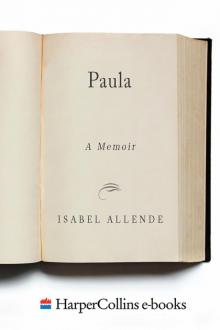 Paula
Paula Ines of My Soul
Ines of My Soul Of Love and Shadows
Of Love and Shadows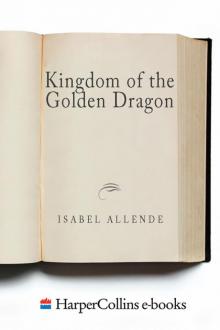 Kingdom of the Golden Dragon
Kingdom of the Golden Dragon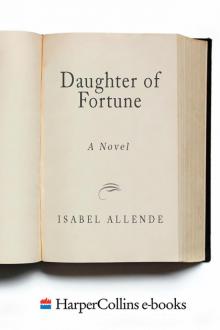 Daughter of Fortune
Daughter of Fortune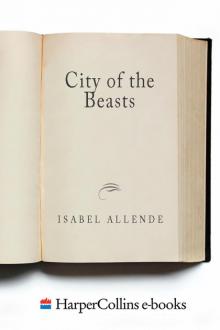 City of the Beasts
City of the Beasts Maya's Notebook
Maya's Notebook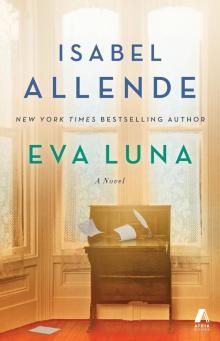 Eva Luna
Eva Luna Zorro
Zorro In the Midst of Winter
In the Midst of Winter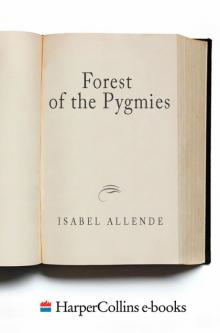 Forest of the Pygmies
Forest of the Pygmies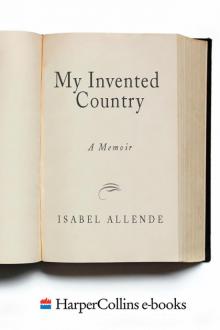 My Invented Country: A Nostalgic Journey Through Chile
My Invented Country: A Nostalgic Journey Through Chile The Japanese Lover
The Japanese Lover Portrait in Sepia
Portrait in Sepia Island Beneath the Sea
Island Beneath the Sea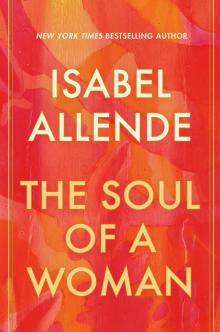 The Soul of a Woman
The Soul of a Woman A Long Petal of the Sea
A Long Petal of the Sea Ines of My Soul: A Novel
Ines of My Soul: A Novel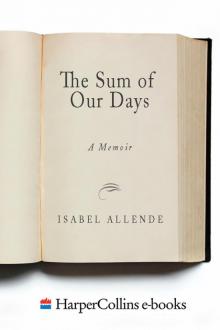 The Sum of Our Days
The Sum of Our Days